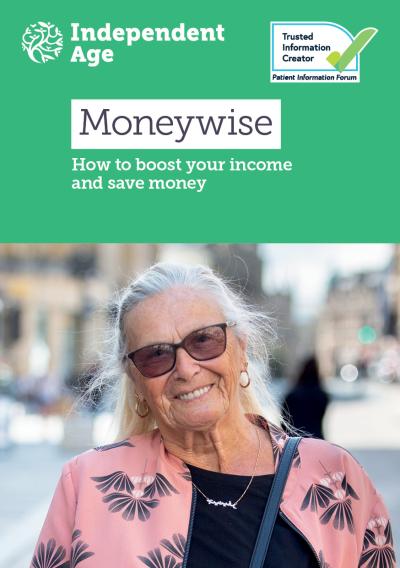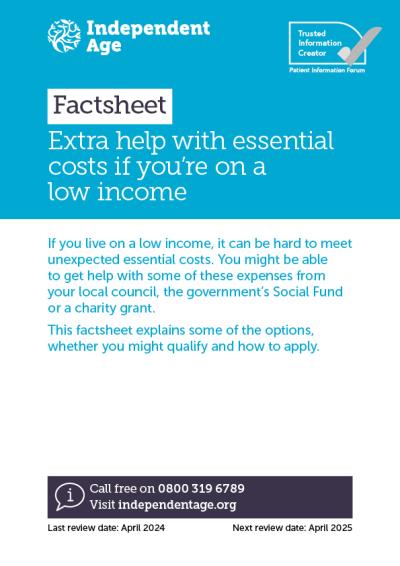Related publications

Moneywise

If you’re on a low income, it can be hard to budget for unexpected expenses and the rising cost of living. You may be able to get help through grants, loans or other types of support.
Call our Helpline if you want to find out whether you qualify for benefits, or use our benefits calculator.
If you're struggling with debt, visit our debt webpages. We have information about different types of debt and advice on how best to manage them.
If you need help in an emergency, or you're experiencing hardship because of the rising cost of living, you may be able to get help from the government or your local council. The help you can get depends on your circumstances and where you live.
England
Ask your local council if they have a Local Welfare Assistance Scheme. These provide help with unexpected or emergency expenses to people on a low income.
Schemes vary from area to area and not all councils run them. Some councils use the money allocated for this to support local projects, such as food banks, credit unions and homelessness prevention schemes.
In some areas, you may be able to apply directly to the council for help, which is usually in the form of:
You can’t usually get cash, but may be given a gift card to cash in at certain shops.
You’re not automatically entitled to help. Contact your local council to find out what’s available and whether you qualify.
Your council should be able to tell you what other local help is available, such as:
Household Support Fund
The government has provided extra money to local councils until September 2024, to help with the cost of living. In England, this is called the Household Support Fund. It’s meant for people who are struggling to pay for food, energy or water bills, for example.
You do not have to be getting benefits to apply and your benefits will not be affected if you get support through this fund.
Your local council decides how to spend the money. Contact your council to find out what support is available.
Scotland
In Scotland, contact your local council if you need urgent help with food, money or fuel costs, for example. You may qualify for a Crisis Grant or a Community Care Grant. For more information, visit mygov.scot/scottish-welfare-fund.
Crisis Grant
You may be able to get a Crisis Grant to cover the costs of an emergency or an unexpected crisis – for example, if:
To qualify, you need to be on a low income, but you do not have to be getting benefits.
Community Care Grant
A Community Care Grant is to help you or someone you care for to live independently in the community. It can help with expenses, such as:
You need to be on a low income, but you do not have to be getting benefits. You may not qualify if you have savings of over £700, or £1,200 if you get a pension, but check with your council.
Wales
In Wales, you can apply to the Discretionary Assistance Fund if you need support. This provides two types of grant:
Individual Assistance Payment
This is a grant to help you or someone you care for to live independently. You can use it to pay for:
You must be getting certain benefits, such as Guarantee Pension Credit or Universal Credit, to qualify.
Emergency Assistance Payment
You may be able to get a one-off payment if you don’t have any other way of paying for essential costs, such as food, gas, electricity, clothing or emergency travel.
To qualify, you must be in extreme financial hardship and in a crisis. For example, if you’ve applied for benefits and you’re waiting for your first payment or you have no money to pay for food, gas and electricity.
Contact the Discretionary Assistance Fund to find out more and to apply.
If you’re waiting to receive your first benefit payment and you’re in financial difficulty, you may be able to apply for a short-term advance. If you qualify, you’ll usually receive the advance the same day or the next working day. How much you get will depend on your circumstances.
You’ll have to repay the advance. Some money will usually be taken from your benefit each week until you’ve paid it back.
Depending on the benefit you’ve applied for, contact:
If you have a hearing or speech impairment and would rather communicate in another way – for example, by using RelayUK or British Sign Language – visit the link for the relevant benefit in the above link.
If you need help with essential one-off expenses and you’re getting certain benefits, you might be able to apply for a Budgeting Loan or Budgeting Advance. These are available for things like:
You can apply for a Budgeting Loan if you or your partner have been getting one or more of these benefits for the past six months:
If you receive Universal Credit, you’ll have to apply for a Budgeting Advance. You can apply through your online account, call the helpline on 0800 328 5644 or contact your nearest Jobcentre Plus.
The amount you receive will depend on your circumstances – the minimum you can apply for is £100.
You don’t have to pay interest on Budgeting Loans or Budgeting Advances, but you will have to repay them. The repayments will be taken from your benefits.
Help with funeral costs
A funeral can be a big expense. You may be able to get a Funeral Expenses Payment – or a Funeral Support Payment in Scotland – to help with the cost. Visit our Paying for a funeral webpage for more advice.

To find out about support and grants in your area, contact:
The government’s Help for Households website has more information about support with the cost of living.
By calling Independent Age's free and impartial Helpline, you can get information and advice from one of our friendly advisers, or order our free guides.